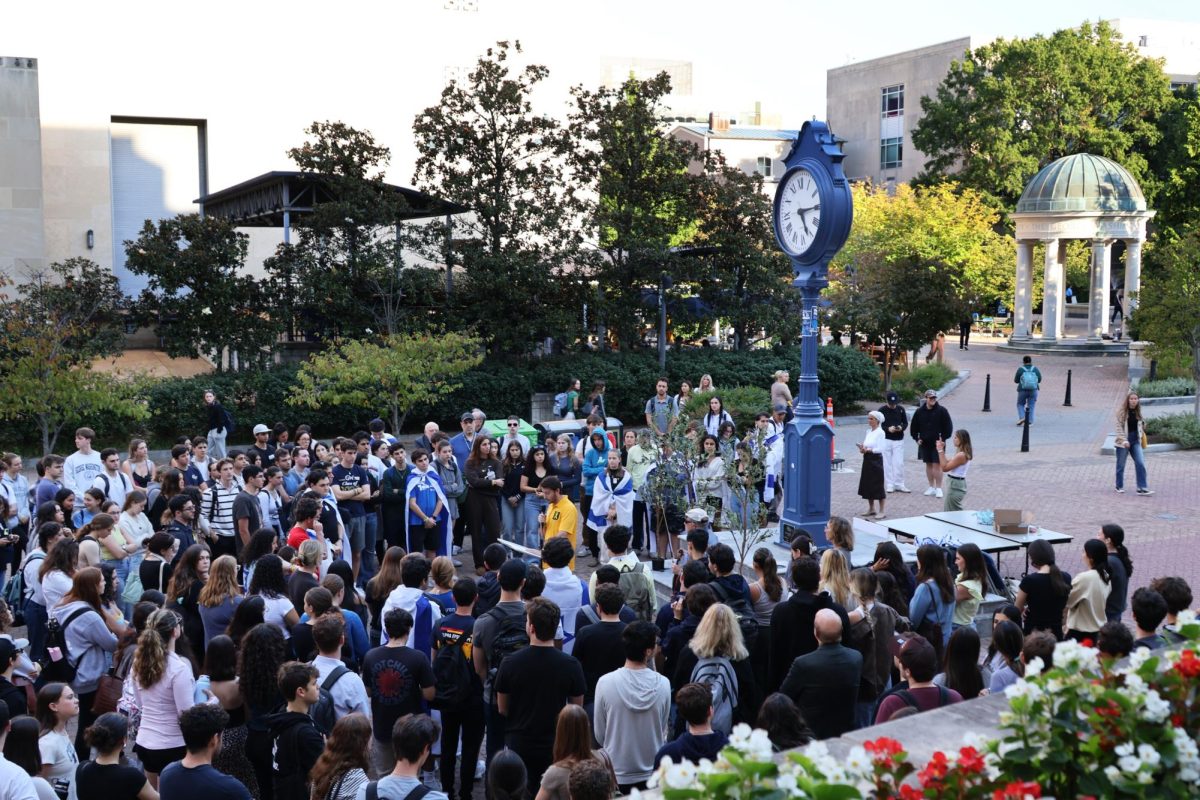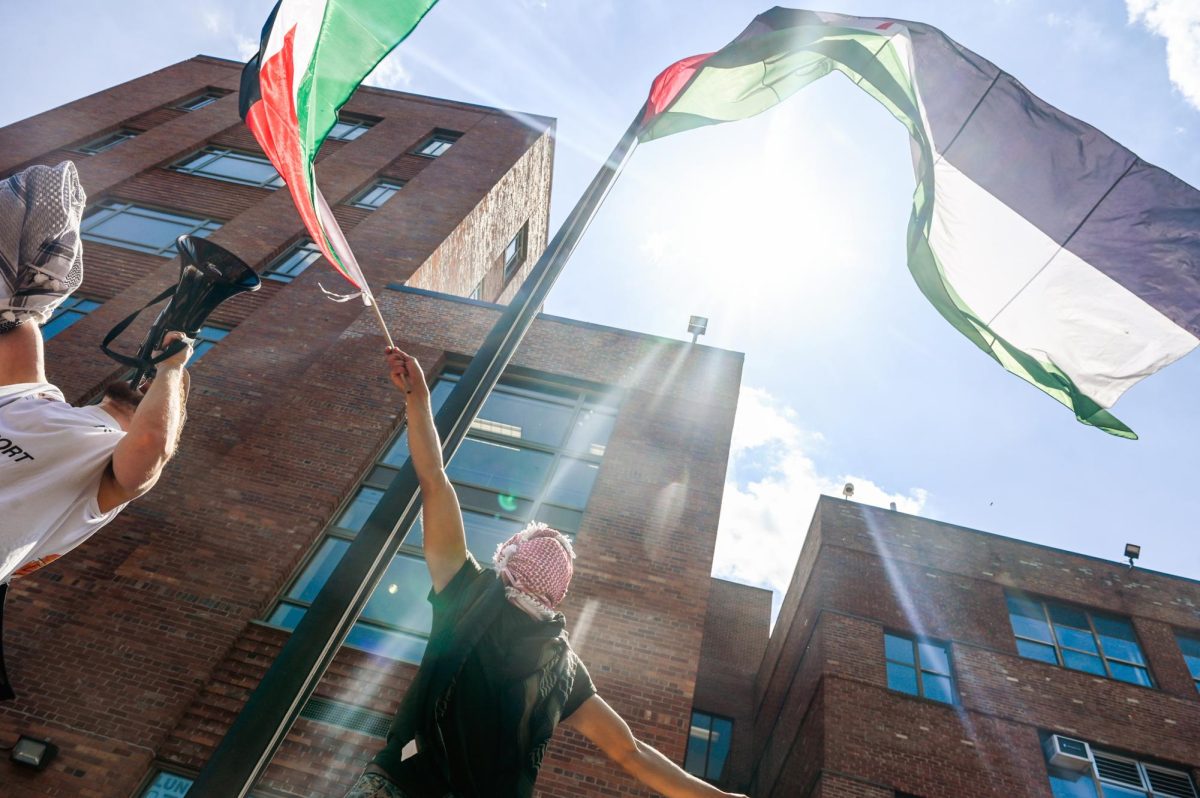Community members gathered in Kogan Plaza Monday evening for a vigil organized by GW for Israel to mourn the one-year anniversary of Hamas’ Oct. 7 attack on Israel.
About 200 community members listened to speakers recount the pain they and their peers have experienced over the past year as a result of the ongoing war between Israel and Hamas. The event’s speakers included students, professors and a rabbi, as well as a violinist who accompanied the crowd’s prayer and song.
On Oct. 7, 2023, Hamas invaded Israel, killing more than 1,200 Israelis and kidnapping 254. In response, Israel’s military launched a devastating counteroffensive in Gaza that has killed at least 41,000 Palestinians. 101 Israelis are still being held hostage in Gaza.
“We as a community have survived October 7, 2023 so we can be back here again for October 7, 2024,” said Sean Shekhman, the vice president of GW for Israel. “We must remain strong as a community and strong as a people so that we can continue to survive until October 7, 2025, 26 and 3027.”
Many students — some wrapped in Israeli flags or wearing kippahs — wore yellow shirts, ribbons or wristbands in honor of those killed and in solidarity with the hostages who remain in Gaza. Most students stayed close to their peers, leaning on one another for comfort. At least nine Metropolitan Police Department officers patrolled across the street from Kogan as several officials in the Division for Student Affairs including Dean of Students Colette Coleman watched the vigil from afar.
Shekhman said he has lost friends because of ideological differences since Hamas’ Oct. 7 attacks, which he imagines applies to most of the people in the crowd. He said it is hard to see peers downplaying the severity of the attacks, but the Jewish community should not allow themselves to be “lowered” to the level of hatred directed toward them.
“We must make sure that this chapter of antisemitism is just that, a chapter,” Shekhman said. “And the only way we can possibly do that is together in one unified community.”
Senior Shani Glassberg said in a speech that she identifies as “an Israeli, an American and above all, human.” She said she, along with every Israeli she knows, was “broken” by the Oct. 7 attacks and the “endless war” that has ensued, remembering childhood friends, family friends and former classmates of hers who were killed at the Nova Music Festival.
“Our hearts have been shattered time after time over this past year, ever since that awful day,” Glassberg said.
Glassberg read the names and ages of the 101 hostages who remain in captivity in Gaza to the silent crowd.
Aiden Rosenblum, the president of GW’s chapter of Alpha Epsilon Pi, said in the face of the tragedy of the Oct. 7 attacks and rising antisemitism over the past year, he is not afraid to be vocal about his Judaism and Zionism. He said the day made him want to have “uncomfortable conversations” with people who ignore his history and culture.
“While this day was full of vile, vile atrocities, I can speak for the rest of the brothers of AEPi when saying that October 7 has made our Jewish identities, in a way, stronger as well,” Rosenblum said.
Sarah Yaniv said she will never forget the morning of Oct. 7, when their phone flooded with news and videos of the atrocities at the Nova Music Festival and across Israel.
She said she texted family members and close friends to check in on them and immediately thought about her grandparents after the attacks because they were born in 1948 and lived through the “triumphs and tragedies” of the modern state of Israel, which include various points of war with neighboring countries.
“To once again witness the ruthless murder of innocent people in the name of a grotesque false rhetoric, and endure that grief all over again. This is the reality for all Israelis. This has been the reality for all Israelis,” Yaniv said.
Yaniv said she finds hope in her family’s history, culture and their cousin who’s serving in the Israeli military. Her cousin’s artillery brigade saluted her for being a proud advocate for Israel after seeing photos of the vigil GW for Israel hosted following the attacks, Yaniv said.
“At first, I didn’t understand why I deserve that honor from people fighting on the front lines for the future of our people, but I see now, after the events that have occurred on campus, the events of the past few weeks, the events of the past year, that our voices are more important now than ever,” the student said. “We are on the front lines too.”
Sophie Homberger, a member of Sigma Delta Tau, a historically Jewish sorority, said she attended Herzl Camp, a summer camp for Jewish kids, where she met Netta Epstein, a 21-year-old man who was killed in his home on Oct. 7 after jumping on a grenade thrown by Hamas to save his fiance’s life. Homberger said Epstein was “a star” at the camp, and she remains close with his sister.
“Everyone loved him,” Homberger said. “He lit up the room and was a role model to so many. He was a hero to kids at summer camp, and to this day, is a hero to his community in Israel. That is how I want him to be remembered – a hero.”
Homberger shared words that Epstein’s fiance, Irene Shavit, wrote for him on the one-year anniversary of his death.
“I look at our videos and I’m happy because I won the love that not everyone wins, and I got the best partner and friend I could ask for,” Homberger said, reading Shavit’s words.
Walter Reich, the Yitzhak Rabin Memorial professor of international affairs, ethics and human behavior, and professor of psychiatry and behavioral sciences, said following Oct. 7, Hamas was still roaming the south of Israel and Hezbollah began attacking Israel from the north in Lebanon, as student groups on college campuses in the United States claimed Israel was entirely responsible for the attacks.
He pointed to chants and phrases that pro-Palestinian protesters deem symbolic of Palestinian liberation as examples of antisemitic language that calls for violence against Jewish people, like “globalize the intifada,” “glory to our marytrs” and “free Palestine, from the river to the sea.” Reich said Hamas, Hezbollah, the Houthis and other militant groups neighboring Israel have embedded themselves in local populations and continue to fight Israel, which has “gone on the offensive.”
He said many people have been killed or will continue to killed in the process.
“This is a time of remembrance, but it’s also a time of tragedy,” Reich said.
Rabbi Yudi Steiner, the director of the Rohr Chabad Center at GW, guided attendees in multiple songs like Am Yisrael Chai, an Israeli anthem, and Oseh Shalom, a Jewish prayer for peace. In his speech, Steiner led a prayer for the remaining hostages held in captivity, Israeli soldiers and Israelis that remain in the country.
Before the prayer, Steiner thanked non-Jewish community members who came to the vigil in support of their peers.
“It takes leadership, courage and moral clarity,” Steiner said. “We will never forget you.”
Throughout the prayer and songs, members of the crowd shed tears, embraced those close to them and clapped along with the violinist who accompanied their words.
As the event concluded, students placed strips of paper on a safety pin, each containing the English and Hebrew name of the more than 1,200 people killed since the Oct. 7 attack, on three olive trees that were placed behind the podium. One student speaker said the trees represent peace, longevity, overcoming challenges and symbolize “Jewish rootedness to our historical homeland.”





